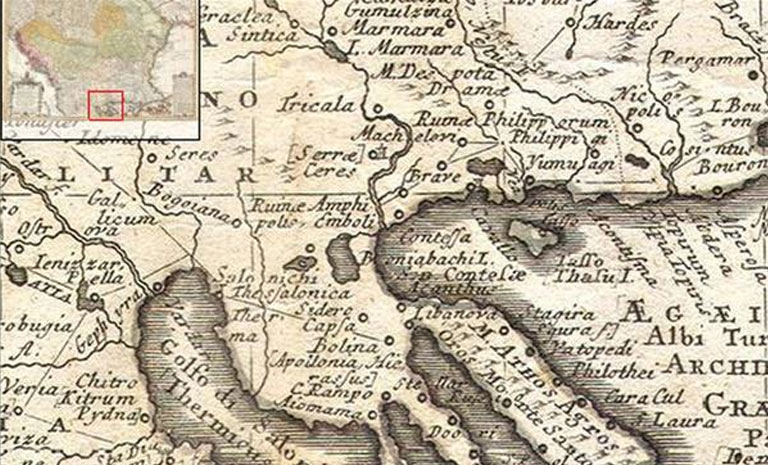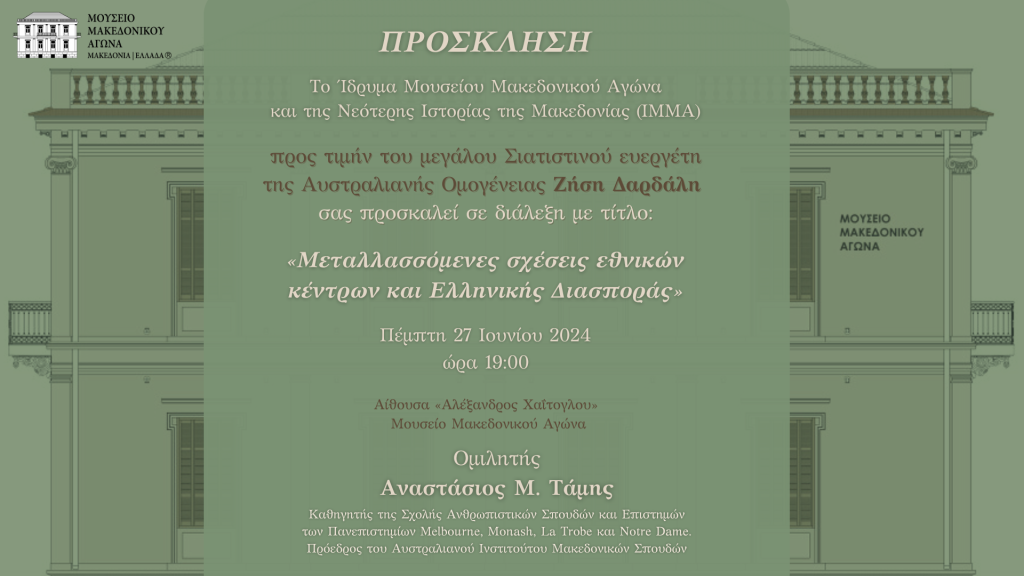A cycle of historical lectures by the Foundation of the Museum of the Macedonian Struggle and Modern History of Macedonia (IMMA)
Events 27 Μarch – 22 Μay 2024

Museum of the Macedonian Struggle
In the context of lifelong education, the Foundation of the Museum of the Macedonian Struggle and the Modern History of Macedonia launches a new cycle of interdisciplinary historical lectures, from March to May 2024, at the Museum’s premises. The modern man’s need for knowledge on national and broader issues of History leads the scientific team of IMMA to educational activities that touch the modern man and illuminate moments that changed our world.
The aim of the lectures is the dissemination of scientific knowledge to the wider public, the training and education of participants in the broad field of the humanities, as well as the promotion of interdisciplinary dialogue through interventions by experts in other related fields, in the form of a “round table”.
Using the method of direct and interactive presentation, the speakers will try to make known issues of History in as objective and multidimensional a way as possible, attempting to bring together new researchers, students and scholars who will be able to fill possible gaps in their knowledge, to educate themselves in the research subject of their study or simply to stimulate their minds.
The lecturers of the lectures are experts in the field of ancient, medieval, modern and contemporary history and other cognitive disciplines. The scientific supervision of the lectures and the entire organization of the programme is undertaken by the Centre for Research in Macedonian History and Documentation (KEMIT) of IMMA.
The lectures are addressed to researchers, teachers, students and anyone interested in or working in the respective fields of knowledge. A certificate of attendance will be issued upon completion of each lecture.
Schedule:
27 March, 18:00-20:00: “Unification or fragmentation: past recipes for Balkan passions”, Ioannis Stephanidis, Professor of Law at the Faculty of Law of AUTH
10 April, 19:00-21:00: “Those who stayed and those who left. The Muslim, Bulgarian and Catholic communities of Thessaloniki”, Vlasis Vlasidis, Associate Professor at the Department of Balkan, Slavic and Oriental Studies, UOM
17 April, 18:00-19:30: Guided tour of the permanent exhibition of IMMA, Dr. Konstantinos S. Papanikolaou, Historian-Scientific Associate of IMMA
24 April, 18:00-20:00: “Austro-Hungary, Germany and the Macedonian Struggle (1903-1908). Convergences and divergences within the Dual Alliance”, Dr. Konstantinos S. Papanikolaou, PhD in Modern History, AUTH – Research Associate at IMMA-KEMIT
15 May, 18:00-20:00: “History and Media: educating consumers of history”, Eleftheria Manda, Assistant Professor at the Department of History and Archaeology, AUTH
22 May, 18:00-20:00: “Alphonse Mucha and the influence of pan-Slavism in his work”, Stavroula Mavrogeni, Professor at the Department of Balkan, Slavic and Oriental Studies of UOM – Director of KEMIT
For registration, interested parties can fill in the participation form:
Cost of attendance:
80 euros (the cycle of 5 lectures and 1 guided tour)
70 euros (the cycle of 5 lectures and 1 guided tour) for students/unemployed persons
or 20 euro/lecture and 15 euro/lecture for students/unemployed
Information & Registration: 2310229778 & kemit.programs@imma.edu.gr
Lecturers’ CVs – Abstracts of presentations:
Ioannis Stephanidis, Professor of Law at the Faculty of AUTH
Summary:
Since the end of the 19th century, the stereotype of the Balkans as a region plagued by endless conflicts of warring nationalisms and volatile borders has prevailed, mainly in the Western world. Indeed, the term balkanisation has become synonymous with territorial fragmentation. But how far does this image correspond to the history of the region, from the emergence of nation states to the present day? Have there been initiatives for cooperation or even unification of the Balkan states, and what have they achieved? This paper will examine phenomena that are not exclusive to the Balkans and remain central to understanding developments at the global level.
Stavroula Mavrogeni, Professor at the Department of Balkan, Slavic and Oriental Studies, UOM- Director of KEMIT
Summary:
Since the end of the 19th century, the stereotype of the Balkans as a region experiencing endless conflicts of warring nationalisms and fluidity of borders has prevailed, mainly in the Western world. Indeed, the term balkanisation has become synonymous with territorial fragmentation. But how far does this image reflect the history of the region, from the emergence of nation states to the present day? Have there been initiatives for cooperation or even unification of the Balkan states, and what have they achieved? This paper will examine phenomena that are not exclusive to the Balkans and remain central to understanding developments at the global level.
Konstantinos S. Papanikolaou, PhD in Modern History, AUTH – Research Associate at IMMA-KEMIT
Summary:
The aim of this lecture is to explore the attitude of the German Empire and Austria-Hungary to the Macedonian Question in the period 1903-1908 and more specifically to the Greek-Bulgarian conflict with the fate of the region at stake. The two central empires had participated in the Dual Alliance (Zweibund) as early as 1879, but Vienna’s desire to promote its interests in the Macedonian provinces in a more dynamic way through the Mürzsteg reform project did not always meet with the understanding of Berlin, where the doctrine of the integrity of the Ottoman Empire determined German policy in the Eastern Question after 1898. The study of Austro-German convergences and divergences highlights the labyrinthine diplomatic paths of the Macedonian Question, which shortly before the outbreak of the Great War was a major topic of political and public discourse for two of the protagonists of the impending conflict.
Vlasis Vlasidis, Associate Professor at the Department of Balkan, Slavic and Oriental Studies, UOM
Summary:
If in 1908, when the Young Turk movement broke out in the Ottoman Empire and the people were celebrating the great changes and the fall of the regime of Sultan Abdul Hamit, someone told the inhabitants of Thessaloniki what was to follow in the next 40-50 years, there was no chance to be believed, as the changes in the city’s housing stock and population were more than in the previous millennium. In 1908 the city was multicultural and based on community organization. In 1962 when the city celebrated 50 years of liberation it was a completely different city. This talk is an attempt to reach out to some of the city’s old communities. The people of Thessaloniki now know a lot about the past of the Israeli community. But there were others. What were these communities? How did they live in the city? How did they leave Thessaloniki? What did they leave behind? Did all the communities leave? Who stayed? What do we know about them?
Eleftheria K. Mantas, Assistant Professor of Modern Greek History at the Department of History and Archaeology, AUTH
Summary:
The talk entitled “History and the Media: educating consumers of history” will focus on the relationship that develops between the science of history, research and its conclusions on the one hand, and the media on the other, a relationship characterized by fruitful processes and partnerships, but which at the same time generates problems and poses dangers both for public opinion, in general, and for the new generation in particular.
Educational seminar on “Kilkis remembers”
Events 14 Μarch 2018




